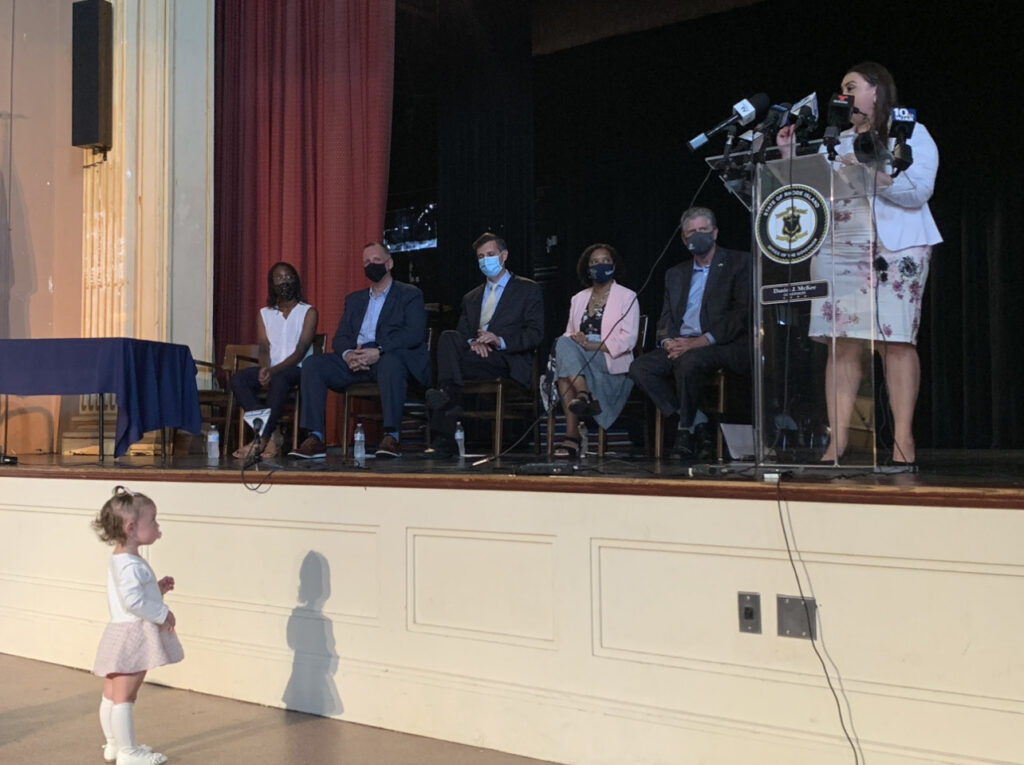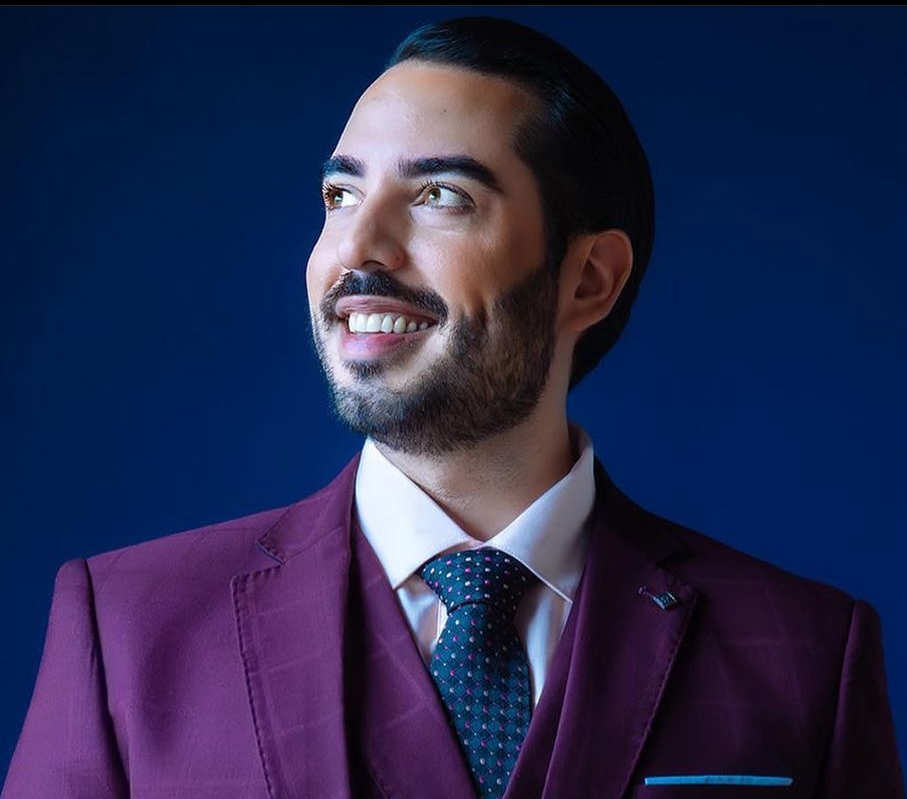
This interview kicks off a series of conversations facilitated by DAIP to elevate inspiring voices that historically have been stifled.
(DAIP): Tell me a little about your personal background.
(Senator Sandra Cano) My family was granted political asylum in the United States in 2000 after my dad was kidnapped in our home country of Columbia. We settled in Pawtucket, and I graduated from Shea High School. I earned my Associate’s degree at Community College of Rhode Island (CCRI), then transferred to Rhode Island College (RIC), and got a scholarship to attend Bryant University, where I received a Bachelor’s in business with a minor in economics. I went on to earn my Master’s in public administration at University of Rhode Island (URI).
When I first came to this country, people made comments to me that really upset me, regardless of what their intentions were. When classmates at CCRI found out that I was from Columbia, they asked if we grew weed in our backyard. I was determined to change that bias through my actions–to conduct myself in a way that changed the incorrect assumptions people had about Colombian immigrants.
I ended up in public service for two reasons. First, I wanted to give back to the country that provided us access to a safe home and the opportunity to pursue educational opportunities, and second, I wanted to change the common narratives associated with the immigrant community.
(DAIP) So you emigrated to the U.S. as a teenager and managed to navigate a career path that requires excellent communication skills. What was that experience like considering that English isn’t your first language?
(Cano) It was really challenging to come here at 16 years old, only knowing the basics of English. I couldn’t really understand the people around me, or string a sentence together.
While at Shea High School, I told my guidance counselor that my childhood dream was to be a journalist. She told me that I should choose a different career path because of my accent. I’m sure her intentions were good, but that really turned my world upside down at that time. Her advice inspired me to immerse myself and focus on my language skills to prove her wrong.
I used to be very self-conscious about my accent. But today I know that because of my accent, I’m able to connect with people that look like me, and I can use my voice to tell the stories of people who wouldn’t normally have a voice–immigrants, hard-working families who struggle to afford an education, women, and people who are multilingual and struggling to communicate. Today I can tell our stories. It’s a huge responsibility but it helped me realize and embrace the power of my voice and the uniqueness and connection that my accent gives me.
(DAIP) That realization is so powerful! So many people–women especially–face imposter syndrome. Do you? And if so, how do you work through that?
(Cano) There have been situations where I’ve felt fear when considering my path forward, and questioned whether I’m qualified to take on that next role.
While I was thrilled to be the first Latina elected to represent the diverse Pawtucket community, and knew I was qualified for the role, I was met with doubt from my peers. I’d constantly find myself at decision-making tables where I was the only one that looked like me, the only woman, and the only one with an accent. And my colleagues talked to me like they didn’t know what I was doing. They underestimated me. They spoke louder to me, as if that would help me understand. Even though I knew that my voice was valuable, that I was qualified to represent my community, and that I had the support of my community, their behavior made me start to doubt myself.
Recently, I’ve been exploring whether to run for Congressman Cicilline’s seat. I know that with my track record, and the balance I’ve found through my support system–my partner, my family–I know I could handle it. It feels like a good decision.
As you do when considering a big race like this, I’ve started making phone calls to gauge people’s opinions. And not everyone shares my confidence. Some people say, “That’s great! We need a woman’s voice, we need a Latina voice. I’m with you all the way.” And others question whether this is the right move. They ask, “Are you sure it’s a good time? Are you sure you can handle it? You just had a baby. How can you balance everything when you just became a mom?”
It’s mostly men telling me that I’m not capable. But even a female reporter recently asked me directly whether I should run as a new mom. I told her bluntly, “Congressman Magaziner just ran for Congress with a ten month old baby at home. My partner just ran for Rhode Island General Treasurer and won. Nobody asked either of them why they were running with an infant at home.” People have expectations of how a new mom should act, and it’s infuriating that they feel comfortable suggesting that I’m a bad mom for wanting to prioritize my career and my family.
My advice to others facing discriminatory comments is that we can’t stay quiet. We’ll never be able to embrace equity if we allow others to continue with their biases unchallenged. And we will continue to let people down if we tell them that an opportunity is not for them because they’re a mom with young children. They’re not seeing the full reality of what you bring to the table, and you need to point that out to them.
(DAIP) Thankfully you’ve been able to ignore the naysayers and break a number of glass ceilings. You became the first Latina ever elected to the Pawtucket School Committee in the city’s history in 2012. You became the first Latina Pawtucket City Councilor in 2014. You are the first woman to Chair the Senate Committee on Education. What has your experience been like being the “first” in these roles?
(Cano) Being the first brings a lot of responsibility, but it’s also an opportunity to speak up for those who don’t have a voice. It’s always been important to me to ensure that if I’m the first to be elected, I don’t want to be the last. Whenever I’m considering leaving a role, I make sure to recruit and engage other women and other Latinas who are qualified to fill that role. I want to ensure we keep voices that represent the community at the table.
In that same vein, as the first Latina ever elected as a Senate Chair, I want to make sure that the first thing I do is work to change the culture in the system. Without my voice, others might not see it. Not because they want to be malicious, but because no one brought up that perspective in the past.
So one of my main goals for my Senate committee was to ensure that my staff was diverse and matched the diversity of Rhode Islanders. Our clerk is trilingual and a woman of color. My attorney is a person of color. Since all the issues that come through my committee will be examined through the lens of equity, I want to make sure that our staff is able to view things through that lens, and also that we ensure that everyone who comes to the committee meetings feels welcome and heard. Ensuring that the committee focuses on equity and inclusion is very important to me.
(DAIP) Since the theme of Women’s History Month this year honors “women who tell stories,” I’ve been thinking a lot about how we write and tell our own stories as women. As a public figure, have you ever felt like others misrepresented your story (peers, coworkers, the media)? How were you able to regain control of the narrative?
(Cano) I can think of many times that people made incorrect assumptions about me, and even created their own narratives about me and my intentions.
Like I mentioned earlier, my colleagues didn’t immediately embrace me when I first joined the Pawtucket City Council. Many of them came from families who had lived in Pawtucket for generations, and some even came from families that had held public service roles for multiple generations. I felt like an outsider in many ways–I wasn’t part of any cliques, and I was the youngest. If I brought ideas to the table that they disagreed with, they often assumed that I was acting out of self interest.
They also questioned how I communicated with my constituency through social media, suggesting that I was creating photo-ops instead of focusing on impactful work. They felt that the sole purpose of the City Council was to create laws. I felt that there should be a secondary role of engaging the community in grassroots efforts and activities that benefit the entire community, so I engaged with the community in different ways that we couldn’t accomplish by simply passing laws.
For example, to positively impact the small business community, I started a community series called Crash Pawtucket. Once a month I’d visit a different small business, buy appetizers, and post on social media asking community members to join me there, support the business, and network.
My goal was to introduce people to all the cool businesses in Pawtucket through grassroots efforts, and my colleagues initially questioned my intentions, assuming I was hosting these meetups in my own self-interest. They eventually realized that this was a new way of engaging the community. There were cultural and intergenerational disconnects that were hard to overcome, but they eventually realized some of their biases against me, and today I have a good relationship with most of them.
(DAIP) You’re a powerful example of learning to own your personal story! Do you have any final words of advice?
(Cano) You can be a mom, a professional, a friend, a daughter–and all those different parts of you that exist at the same time are just part of your potential. I can consider my role as a mom to be my most important title, but that doesn’t take away from my ability to be a professional, a Director of Commerce, and a legislator. My role as a mother doesn’t take away from my ability to make an impact on the state, and I’m allowed to have ambitions to do more. As women, we need to be empowered to make our own decisions without the limitations of other people’s labels. I know my abilities and my limits better than anyone–and so do you!

